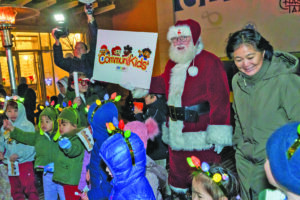The Falls Church City Council gave a unanimous “first reading” approval late Monday to a new plan to charge residents separately for their trash pick-up, rather than the long-standing policy of having it included in their residential real estate tax bills.
The new plan involves a two-tier billing process, more for those using 65 gallon trash containers and for those using 35 gallon containers.
A final OK on the plan is expected at the Sept. 8 Council meeting, in time for the first round of bills to be listed on the fall real estate tax bill that comes out in November. In conjunction with that change will come a 1.5 cent reduction in real estate tax bills for everybody, from $1.20 to $1.185 per $100 of assessed valuation.
The change has been a long time coming for residents of multi-family projects that do not receive the weekly trash pickup service but have been paying for it as an included part of their real estate tax bill. There are 3,107 residential addresses in the City that receive the weekly service, constituting 82 percent of the total properties.
Over many years, residents of the Park Towers condo building on N. Maple Ave. have been periodically coming to Council meetings to complain about being charged through their real estate taxes for a service they did not receive. But this marks the first time they were heard and the Council decided to do something about it.
A contingent of Park Towers residents showed up at Monday’s meeting to stand while Gail Wordsworth, a Park Tower resident who said she first spoke to the matter 38 years ago, spoke during the petition period of the meeting.
There was no significant dissent on the Council about the new policy being adopted, but it took a long time to concur on the price differential between residents placing larger versus smaller containers on the curb each week.
In preliminarily approving an ordinance, the Council finally adopted one that included the option of two different pricings, with one to be finally determined on the night of the ordinance’s final OK due Sept. 8.
One differential has users of the larger containers being charged $327 a year, and the smaller ones $252 a year. The second option calls for a $100 difference between the two rates, at $336 or $236.
Mayor Letty Hardi noted that an added purpose to seeking the fairness that the Park Towers residents have been seeking is an incentive embedded in the pricing differential that encourages recycling by virtue of the savings for those using the smaller containers, with the goal of “shifting behaviors” toward recycling.
City Manager Wyatt Shields called the two-tier billing policy, in this context, “a win for Falls Church. Not even Fairfax County can pull this off.”
But Council member Marybeth Connelly stressed that the purpose is mainly to make the matter “fair” for all residents, noting that “for many many years it was not, but nobody knew.” Veteran Park Towers residents might say instead, “but nobody listened.”
Other actions taken by the Council at this Monday’s meeting included:
* The Council, hearing from Brendan Woodley of the Affordable Housing Working Group,
adopted an expanded eligibility and wider-ranging set of qualifications for lower-income citizens seeking tax relief through deferrals or exemptions. Jeff Person of the Human Services Advisory Council responded, “I’m thrilled that the City of Falls Church City Council has adopted the new Affordable Living Policy — an ambitious proposal I helped shape as co-chair of the committee that wrote it. This is a meaningful step toward addressing our community’s housing affordability crisis.”
* The Council approved a pay raise for members of the Planning Commission from $150
to $300 a month for the chair and $100 to $250 a month for members, with the total cost rising from $9,000 a year to $21,600.
* The Council heard a report from the City Planning Department, including Capital Improvement Projects coordinator Caitlin Sobsey and new department director Amanda Brain, about the 20 projects around the Little City that are on target for completion, and 11 that are slightly behind and six labelled “at risk.”
The projects range from the solar panels on the Aurora House to the completion of the baseball field at Meridian High School and the concession stand and restrooms, all of which are due to be completed by the spring of 2026, and the reopening of the post office after hours.
Mayor Hardi said she considers sidewalk repairs around the city, including repairs and also filling missing links, a priority. “It’s the Number One thing we hear about,” she said.
At the urging of Council member Laura Downs, who attended remotely from Lancaster, Pennsylvania where she was helping a son move into college, the City’s Public Information Office put out Tuesday a special edition of its online Focus newsletter with a “Focus on Wins in the Capital Improvement Program,” ranging from the Broad Street HAWK signals, to the Community Center geothermal HVAC installation, Community Center generator, the synthetic field replacement at Meridian High, the Berman Park playground (that was unveiled at an event prior to the start of Monday’s meeting), public safety radios, Berman Park trail crossings, the sidewalk at 412 W. Broad, Hillwood Ave. stormwater improvements, and the Wallace Street sidewalks,
* The Council adopted a resolution recognizing the contribution of Robert Lazaro, long time head of the Northern Virginia Regional Commission, who looked on remotely, and of Childhood Cancer Awareness Week. That one noted that “the American Cancer Fund for Children and Kids Cancer Connection report that cancer is the leading cause of death by disease among U.S. children between infancy and age 15. This tragic disease is detected in more than 16,000 of our country’s young people every year. An estimated 400,000 children and adolescents are diagnosed with cancer globally each year.”












